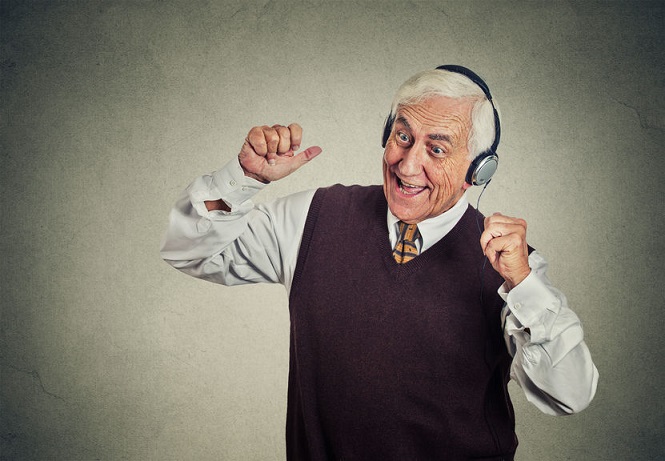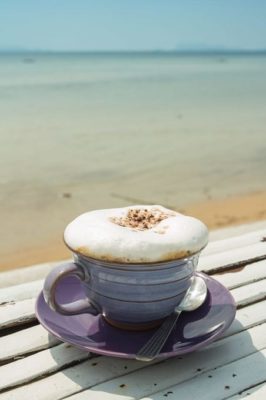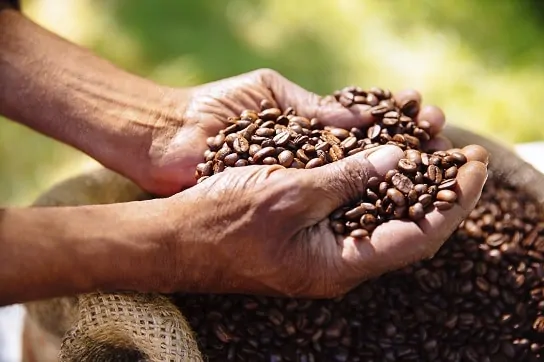 Sometimes, it feels like the odds for a coffee-loving acne patient are insurmountable.
Sometimes, it feels like the odds for a coffee-loving acne patient are insurmountable.
We’ve already charged through the barrier of caffeine sensitivity, leapt across the chasm of mouldy mycotoxins, and rolled under the random sensitivity bridge. But at the last second, when victory seemed at hand, we’re now faced with the vast, towering wall of coffee’s ageing dangers.
If you browse skincare forums then you’ll see statements like “I’m ditching coffee because I don’t wanna get wrinkles”. Or maybe: “coffee causes premature ageing, you might want to rethink that diet plan”.
It’s like a tale ripped straight from the pages of Hollywood; a man sits in a diner with a cup of coffee, the picture fades out, and suddenly, he’s sitting in the exact same booth, just 50 years older. If it was a documentary, a laughing woman would be shown drinking coffee, before a sudden zoom into the microscopic canyons of her skin pores, showing collagen proteins crumbling like landslides, complete with dramatic voiceover.
If the holy grail provides water imbibed with eternal life, then coffee is supposedly the opposite: an irresistible beverage that takes life from you. But where do these ideas come from?
There’s some accuracy to them, but coffee also has anti-ageing powers.
The 3 classic arguments
Firstly, the main internet fear is nothing supernatural, nor overly technical: it’s caffeine’s diuretic, or water removing properties. Supposedly, coffee will dry your skin out, making wrinkles much more likely.
It’s true that caffeine increases blood flow to kidneys, and prevents sodium absorption, flushing liquid out of your body as an alternative. However, small amounts won’t turn you into Gandalf. The moment you reach the danger threshold, you’ll feel the thirst in your mouth and you’ll automatically be reaching for a glass of ice cold water (or maybe more coffee). The skin drying powers will usually be a temporary problem, a brief loss of water.
Caffeine’s sleep blocking powers are also referenced, which it achieves by blocking adenosine receptors, the drowsiness neurotransmitter. Sleep deprivation does age you, there’s no doubt about that – just look at every single US president. Every 8 years (or 4), we have a real time scientific study, not hidden inside a secret lab but broadcast worldwide on the evening news. The job showed up on Tony Blair’s face too over 10 years, although he might call it “wisdom”.
Again though, this is no supernatural ageing power – it’s right in your sights. It’s dead easy to control, and people already are. Who doesn’t restrict their caffeine intake before bed?
It’s similar with stress, albeit ever so slightly subtler. Caffeine can spike cortisol by 60%, and this stress hormone is notoriously greedy for collagen, stealing its amino acids to give you fight or flight energy.
Yet it’s the exact same story. Your collagen will always have natural peaks and valleys. Restrict caffeine to two or three cups daily, depending on whether you have fast CYP1A2 caffeine-processing genes, and a fast track ticket to grandma territory won’t be in your sights.
The top three coffee ageing fears on the World Wide Web are very easy to control.
There’s also many forum posters who don’t mention powers at all, but have a feeling of paranoia, vague memories of 100 different scare stories they’ve glanced at over the years.
The 1970s and 80s were particularly hot for anti-coffee studies. To this day, heart attack studies appear weekly in the media. One minute, everyone “knows” that coffee is unhealthy, but the next, its reputation is restored. This cycle is expertly engineered to glue people’s eyes to the headlines, but it makes people either 1) suspicious of every food, or 2) suspicious of every newspaper headline. People are paranoid that all vices are have a hidden dark secret somehow, whether it’s beer (liver problems) or chocolate (acne).
That’s why the ageing fears over caffeine ring true for many people.
It feels like a poisoned chalice too. Coffee might give you superhuman focusing skills for exam revision, but there’s no such thing as a free lunch.
Coffee might not even age you, but slowly degenerate you into a coffee-addicted gremlin. One day, you’re chatting with your friends in a coffee bar. 20 years later, you’re a caffeinated cousin of Gollum hiding in the darkness outside coffee restaurants, slinking along the walls until the moment they open at 8 o’clock.
Why coffee is an antioxidant potion
 However, the truth is that your coffee addiction might well delay your ageing.
However, the truth is that your coffee addiction might well delay your ageing.
Why? Because the coffee bean is packed with antioxidants, and almost all end up in the mug you drink. Even a basic Starbucks plastic cup will contain plenty.
Coffee contains 1000 antioxidant subtypes, and hundreds more are created during roasting. It’s loaded with chlorogenic acid and the closely related caffeic acid. There’s the polyphenols 5-O-caffeoylquinic acid, 4-Ethylguaiacol and pyrogallol. There’s lignans like kaweol and cafestol. Roasted coffee actually has more antioxidants than green beans (with the exception of chlorogenic acid, which falls), whereas with most foods like broccoli, it’s the opposite.
This is the top reason why isolated caffeine is a very different animal to full, natural coffee.
Vicious free radicals lack electrons in their molecular structure, forcing them to rob electrons from healthy cells. Antioxidant work wonders by donating electrons in their place.
Thus, drinking coffee will gradually protect the DNA encoding important youth proteins. Air pollution free radicals will bounce off the collagen and elastin they seek to destabilise. Buzzing around your skin like bees, they won’t make it far before antioxidants snatch them up. Even the plant antioxidants that provide glow and pigment will be protected; these glow gains are possible at any age.
Coffee addiction will give you a consistent, years long armour against free radicals the moment they arrive. In fact, without the national coffee obsession, I wonder how unhealthy most Americans would be; cancer is already an epidemic. Coffee is the average American’s number one antioxidant source.
Likewise, Japanese women supposedly acquire 79% of their antioxidants from beverages rather than food (including coffee). In Norwegian and Finnish studies, coffee made up 64% of total antioxidant intake.
Before he died in December 2018 aged 112, the oldest living US male was Richard Overton.
He was the oldest American World War 2 veteran ever, serving in South Pacific hotspots like Hawaii and Guam from 1940 to 1945. His secrets for long life? Starting every day with 4 cups of coffee, infused with whisky and accompanied by cigars. His other secret was simply “don’t die”.
Does coffee reduce collagen?
This case is hardly closed, however. Barring a hidden molecule planted inside the coffee bean to age anyone who succumbs to its temptations, there’s a single very nasty looking study.
Isolated human skin cells were simply inundated with raw caffeine or hyaluronic acid. In their words: “caffeine inhibited collagen biosynthesis in a dose-dependent manner“. Newly manufactured collagen plummeted, while hyaluronic acid had no effect.
Worryingly, the mechanism was pinpointed – inhibiting the prolidase enzyme by 17.5%.
All collagen consists of the three amino acids lysine (3-4%), proline (17%) and glycine (32%). Prolidase recycles old, fraying prolidase into new collagen, after it’s initially broken down into imidodipeptide fragments by enzymes like MMPs. The MMPs do the hard demolition work, and prolidase picks up the rubble littering the streets.
This recycled proline ends up in freshly repaired wounds, or the normal youth-giving collagen bricks of your skin.
As for caffeine, it suppressed prolidase by decreasing insulin-like growth factor 1 (IGF-1). This milk hormone is a classic acne villain, but also regulates skin cell growth, and its connection to prolidase is well established. Caffeine also suppressed β1-integrin, which dabbles in both DNA creation and prolidase.
This is the only study so far, but they hit the ground running and identified three collagen-reducing pathways.
Collagen – a tale of redemption
 So is coffee’s reputation lying in tatters? It’s undoubtedly worrying, but the answer is no.
So is coffee’s reputation lying in tatters? It’s undoubtedly worrying, but the answer is no.
Firstly, it was a clinical laboratory setting. It wasn’t even a human being drinking coffee, let alone a teenager exercising and eating dozens of other collagen-interacting foods on her university campus.
Isolated cell studies can be valuable, but this one falls into a classic trap – the dosage was far too massive, with 5mM of caffeine per isolated skin cell. An ordinary coffee cup contains 200mM, but this is distributed throughout the body. It gets busy firing up your heart beat, making your muscles twitchy and giving you a bottomless well of mental energy (before you later crash on the sofa, paralysed). This study does not represent a real morning pick me up.
Luckily then, we have this study on energy drinks. In rat cells, energy drinks delayed the healing of a simple scratch wound. But here’s the interesting part. When testing its isolated ingredients like glucose, taurine, and caffeine, collagen held steady.
Its surprising that glucose wasn’t responsible, as high blood sugar forms advanced end-glycation products (AGEs) which damage collagen’s protein cross-links. AGEs are the main reason why sugar ages you. Maybe it was the combination of sugar and caffeine.
Nevertheless, if caffeine did reduce collagen, it was so weak that it couldn’t even affect wound healing.
Furthermore, the first study couldn’t take into account other dietary choices. What if certain antioxidants like quercetin or anthocyanins can preserve prolidase? The same goes for companion compounds in coffee itself, like chlorogenic acid or caffeic acid, in a more balanced natural package.
That said, we cannot conveniently ignore the study. The real worry is the highly specific pathway involving prolidase; it makes protection from other coffee compounds much less likely (though not impossible). It’s more unpredictable compared to mould-borne mycotoxins for example, which unleash free radicals but are easily counteracted by coffee’s antioxidants.
For now, the jury’s out. Combined with cortisol, the collagen-degrading stress hormone, it could be a double hit.
Sunlight – how coffee can thwart it
But before you surrender to the inevitable and book your weekly bingo session, here’s some better news: coffee can protect your skin against sunlight.
By extension, it may delay the photoageing from sunlight, the leathery parchment-like skin of wild west ranchers. There’s no conclusive study, but check out the juicy facts discovered so far:
ONE: drinking coffee can inhibit the ATR molecule, which naturally prevents the apoptosis (programmed death) of malignant cancer cells.
TWO: coffee’s signature antioxidant is caffeic acid, with around 195.7mg per tasty 100 gram cup. Caffeic acid also blunted the inflammatory chemical COX-2 which UV radiation increases.
THREE: in 609 Italian hospital patients, daily coffee drinking or more (as reported by questionnaire) reduced the risk of cutaneous melanoma , the deadliest form of skin cancer (study).
FOUR: rubbing caffeine into someone’s face can prevent sunlight from increasing NF-kappaB, the pro-inflammatory molecule. This happens by decreasing two obscure proteins called PKC and ATM (study).
The evidence for coffee’s sunlight protection has strengthened to a flood which is washing away all doubters in its path. Photoageing protection is certainly on the cards. Its dangers involve generating free radicals like 8-OHdG, and fuelling inflammation, the same inflammatory chemicals like COX-2 which plummeted above.
It’s partly the antioxidants, and partly the immense power of caffeine itself. Its interactions with bodily genes, proteins and enzymes are immensely complex, and that’s why we can’t fully judge its precise ageing powers.
Normal ageing – how coffee can slow it
 To test the speed of skin ageing, you also cannot ignore overall ageing.
To test the speed of skin ageing, you also cannot ignore overall ageing.
The two are far from mirror images, but with common causes like free radical overload and chronic inflammation, they are intricately woven together.
Our tour makes its first stop on the remote Greek island of Ikaria. This place of traditional architecture and glittering blue beaches holds the world record for people living to over 90.
The centenarians are unusually fit, jogging as though they can’t remember their birthday – the saying is that Ikarians forget to die. Ikaria is part of the “blue zone” of extreme longevity alongside 4 other fabled lands: Sardinia, Okinawa, Nicoya in Costa Rica and Loma Linda in California.
The connection to coffee? Ikarian citizens drink plenty of it.
Specifically, they have a special boiled coffee recipe, which reduces caffeine but unlocks extra polyphenolic antioxidant potential. Youth obsessed scientists sailed to the island by a rickety rowing boat (or maybe a plane) and found that 87% of Ikarians drank this boiled coffee recipe daily. 71 men and 71 women aged over 65 were questioned.
Our second stop is a secretive laboratory, on the summit of Swiss mountain accessible only by helicopter with blizzards howling all around. Actually, it was in Utah, but anyway, the subject was the anti-ageing holy grail of telomeres.
Telomeres are nucleoproteins that form “caps” at the end of chromosomes. Every time cells divide, the telomeres grow shorter, never dividing themselves. Telomere length is a marker for future replication potential, for how much an organism can repair itself, and therefore a marker for someone’s future lifespan. Eternal youth hunters are obsessed with telomeres – except for uploading your brain into a supercomputer, they believe that extending them is the key. Who knows – maybe the fountain of youth itself consists of liquid telomeres.
In this 2017 study, telomeres became 35.4 base pairs shorter with every extra 100mg of caffeine drunk. Yet somehow, coffee consumption made telomeres longer: “caffeine consumption accounts for shorter telomeres in U.S. adults… whereas coffee intake predicts longer telomeres“.
Caffeine and coffee continue to have very different effects on ageing.
The moment of truth
It all comes down to this. We can chuck scientific terms at the wall till the cows come home, but if studies on humans show premature ageing, then it’s all meaningless. So far, we only have two:
ONE: in Turkey, 337 women and 237 men aged between 18 to 89 years had every aspect of their lifestyle examined by a detailed questionnaire. This included smoking, BMI, coffee consumption, exercise, alcohol consumption – the list went on. Coffee consumption had no association with premature wrinkling. Neither did alcohol consumption (yay!) or sports activity (yay?).
Meanwhile, wearing sunglasses protected against facial wrinkling, as did sunscreen usage. Heavy smoking, heavy sun exposure, and being a man all doomed you to friendly local grandpa status (study).
TWO: coffee, and particularly polyphenol rich coffee containing chlorogenic acid, protected against dark pigmented spots from sunlight in 131 Japanese women aged 30-60. The conclusion couldn’t be clearer: “We speculated that coffee helps protect human skin from photoaging” (study).
Neither is an iron game changer. Ageing is inherently hard to measure. You have to rely on questionnaires rather than proper experiments, as you can’t wait for wrinkles to form in a lab (and the patients would probably object).
But if coffee was a pro-ageing monstrosity, then wrinkles would be bound to show up. At best, its dangers seem to be subtle.
Conclusion
Where do we stand? Is coffee off the menu for good? Truthfully, we cannot say, but I’m leaning towards coffee being safe in moderation, and probably beneficial in lands of scorching sunlight.
The collagen study is by far the most worrying; blocking prolidase is such a specific pathway. Luckily, we’re saved by 1) the gingantic dosages used, and 2) that it only tested isolated caffeine.
Even if the prolidase powers aren’t counteracted, coffee’s antioxidants will at least shore up other cracks in your collagen armour like free radical attack, and possibly the collagen-degrading enzymes which sunlight increases (like MMPs).
As for the 3 “main” dangers? Simply restrict coffee to two or three cups daily.
I’m not ruling out other ageing powers. Time will tell, but if you avoided every slightly suspicious food, your break, lunch and dinner would consist only of cucumbers.
You’d have to become like that guy who claimed to derive all his calories from sunlight. Supposedly, he trained his eyes to look for longer into the sun everyday without severe damage. At first, it was 5 seconds, and before long, it was 5 minutes. Then, in the backstage of a lecture in front of hundreds of starry eyed admirers, he was supposedly caught guzzling pizza!
Thanks for reading!

I still find that my sllep is disrupted when drinking one cup of coffee in the morning. What if anything would you recommend?
That’s a long time for coffee to last in the body, so you might have weak caffeine processing genes like CYP1A2-F (see my article on caffeine genes). But even then it’s a long time for one cup of coffee to last. There’s no way to control the genes so my suggestion is simply to double down on other important areas of sleep like taking magnesium, installing FLUX (a computer program that converts all light output on the screen to red light, which doesn’t suppress melatonin), keeping lights dimmer in the evening, shifting your carbohydrate intake to before bed time, checking whether you’re eating enough of the amino acid glycine, etc.
I’m here and worried. I was a daily 1 to 2 cup drinker and despite taking loads of collagen and supplements the wrinkles were forming. I switched to black and green tea and the skin is looking better, less wrinkly. I am ADD so I need some caffeine but also a bit vain. So I may experiment with a week of no caffeine if I can bear it and see how the skin looks. Ugh